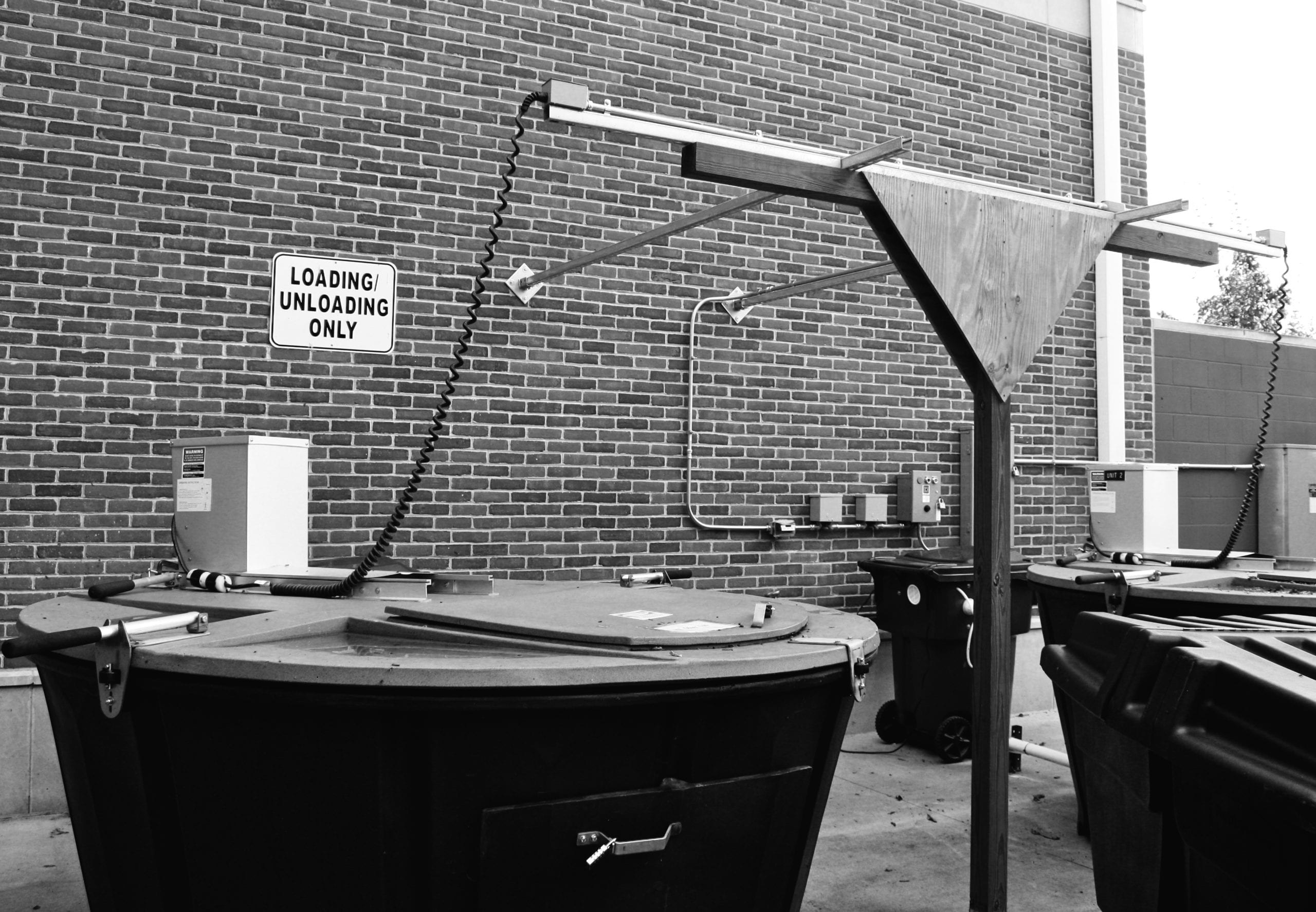By MONICA PENCE – CENTO WRITER
Centre is “greening” its dining services with new composting and food waste management programs.
Two new large composting vessels now sit behind the Campus Center near the dumpsters, and they have been filled daily with Cowan’s pre-consumer waste since Sept. 10.
By chance, Sodexo, Centre’s food service provider, had started implementing LeanPath, an automated food waste tracking system, around the same time as the composting system started operation.
Since the waste tracking system was already in place, the composting project was built through the LeanPath program, according to Centre Dining Services General Manager Mike Nagorka.
Chair of Natural Science Program Dr. Preston Miles called this coincidence “serendipitous,” Miles, Nagorka, and two work-study students have been working tirelessly on the composting project.
Last year, former Professor of Environmental Studies Dr. Cindy Isenhour applied for a grant from the Environmental Protection Agency to begin a composting program on Centre’s campus.
The $27,548 grant was awarded and was used to buy the first composting tub and other equipment needed for the project.
Miles said the parent’s fund supported purchase of the second tub.
The system is a closed-vessel system, as opposed to an open stack system.
An open stack system, though cheaper, “didn’t make sense on Centre’s campus,” Miles said.
This is because the open stack system requires more open land, and it comes with the difficulties of a greater smell and possible visits from scavengers.

This extra management is performed by the two work-study students and sustainability assistants junior Bill Schild and first-year Adam Johnson.
The students take turns working with the system. “I check the temperature of the first bin. That gives us a good idea of whether it’s decomposing well,” Johnson said.
Miles explained that they have been keeping the temperature between 120-140 degrees Fahrenheit. “The heat comes from microbial organisms, which are breaking down the organic matter,” Miles said.
In addition to checking the temperature, the students work with Sodexo staff to calculate the correct amount of wood chips to add to the food waste in composting bin, since a specific mixture of wood chips and food matter are necessary for optimal composting.
The students then turn the compost mixture once clockwise and once counterclockwise, “so everything is meeting the temperature and nothing is staying on top,” Johnson said. The whole process takes one to two hours a day.
So how much waste is going into the bins? According to Johnson, about 120 pounds of pre-consumer food waste a day, with spikes of 300 pounds.
“About three quarters of the food is not going to the landfill,” Nagorka said. “Hopefully we’ll save six to seven trips to the landfill.” This means a reduction in the cost of trucking waste and reduced carbon emissions.
The coincidental LeanPath waste tracking program has already generated valuable waste information, which is not only helpful for measuring waste going into the composting system, but also for increasing efficiency and cost savings.
The program is one that Sodexo has begun implementing on many college campuses.
Though it is a pricey $20,000 program, “It is spread over three years, and in two years you should see the savings that pay for that,” Nagorka said.
“It’s seen a reduction in food costs so far, by about a percent since last year.”
The program gives them an estimate of how much food waste costs. “We have a Strategic Waste Operative Team (SWOT) [made up of] five individuals led by [Executive Chef Bryan Minton], who review and analyze the paperwork and start to build ways to reduce waste,” Nagorka said.
What they find then leads to new waste-reducing practices in the kitchen.
According to Nagorka, changes may include having kitchen staff members cook less, cutting down on portioning, and switching to smaller pans.
The money saved by eliminating waste can then go toward other Cowan projects, programs, and events.
The program has “given us targeted areas to improve … and it brings it down to the employee level, so they’re the ones making the decisions,” Nagorka said.
The Cowan employees themselves weigh out the food, categorize what type of waste it is through the LeanPath program, and then carry it to the compost bins in buckets.
With the composting and waste tracking projects still in their initial stages, it will be interesting to see what the results will be for the Centre community.

